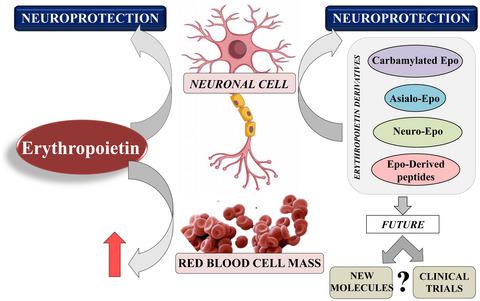当前位置:
X-MOL 学术
›
J. Neurochem.
›
论文详情
Our official English website, www.x-mol.net, welcomes your feedback! (Note: you will need to create a separate account there.)
Erythropoietin and derivatives: Potential beneficial effects on the brain
Journal of Neurochemistry ( IF 4.7 ) Pub Date : 2021-07-19 , DOI: 10.1111/jnc.15475 Daniela C Vittori 1 , María E Chamorro 1 , Yender V Hernández 1 , Romina E Maltaneri 1 , Alcira B Nesse 1
Journal of Neurochemistry ( IF 4.7 ) Pub Date : 2021-07-19 , DOI: 10.1111/jnc.15475 Daniela C Vittori 1 , María E Chamorro 1 , Yender V Hernández 1 , Romina E Maltaneri 1 , Alcira B Nesse 1
Affiliation

|
Erythropoietin (Epo), the main erythropoiesis-stimulating factor widely prescribed to overcome anemia, is also known nowadays for its cytoprotective action on non-hematopoietic tissues. In this context, Epo showed not only its ability to cross the blood-brain barrier, but also its expression in the brain of mammals. In clinical trials, recombinant Epo treatment has been shown to stimulate neurogenesis; improve cognition; and activate antiapoptotic, antioxidant, and anti-inflammatory signaling pathways. These mechanisms, proposed to characterize a neuroprotective property, opened new perspectives on the Epo pharmacological potencies. However, many questions arise about a possible physiological role of Epo in the central nervous system (CNS) and the factors or environmental conditions that induce its expression. Although Epo may be considered a strong candidate to be used against neuronal damage, long-term treatments, particularly when high Epo doses are needed, may induce thromboembolic complications associated with increases in hematocrit and blood viscosity. To avoid these adverse effects, different Epo analogs without erythropoietic activity but maintaining neuroprotection ability are currently being investigated. Carbamylated erythropoietin, as well as alternative molecules like Epo fusion proteins and partial peptides of Epo, seems to match this profile. This review will focus on the discussion of experimental evidence reported in recent years linking erythropoietin and CNS function through investigations aimed at finding benefits in the treatment of neurodegenerative diseases. In addition, it will review the proposed mechanisms for novel derivatives which may clarify and, eventually, improve the neuroprotective action of Epo.
中文翻译:

促红细胞生成素及其衍生物:对大脑的潜在有益影响
促红细胞生成素 (Epo) 是一种广泛用于治疗贫血的主要促红细胞生成因子,如今也因其对非造血组织的细胞保护作用而闻名。在此背景下,Epo 不仅表现出其穿越血脑屏障的能力,而且还表现出其在哺乳动物大脑中的表达。在临床试验中,重组 Epo 治疗已被证明可以刺激神经发生;提高认知;并激活抗细胞凋亡、抗氧化和抗炎信号通路。这些机制旨在表征神经保护特性,为 Epo 药理学效力开辟了新的视角。然而,关于 Epo 在中枢神经系统 (CNS) 中可能的生理作用以及诱导其表达的因素或环境条件,出现了许多问题。尽管 Epo 可能被认为是用于对抗神经元损伤的有力候选者,但长期治疗,尤其是需要高剂量 Epo 时,可能会诱发与血细胞比容和血液粘度增加相关的血栓栓塞并发症。为了避免这些不利影响,目前正在研究没有红细胞生成活性但保持神经保护能力的不同 Epo 类似物。氨基甲酰化促红细胞生成素,以及替代分子,如 Epo 融合蛋白和 Epo 的部分肽,似乎与这种特征相匹配。本综述将重点讨论近年来报道的实验证据,通过旨在发现治疗神经退行性疾病的益处的研究,将促红细胞生成素和中枢神经系统功能联系起来。此外,
更新日期:2021-08-26
中文翻译:

促红细胞生成素及其衍生物:对大脑的潜在有益影响
促红细胞生成素 (Epo) 是一种广泛用于治疗贫血的主要促红细胞生成因子,如今也因其对非造血组织的细胞保护作用而闻名。在此背景下,Epo 不仅表现出其穿越血脑屏障的能力,而且还表现出其在哺乳动物大脑中的表达。在临床试验中,重组 Epo 治疗已被证明可以刺激神经发生;提高认知;并激活抗细胞凋亡、抗氧化和抗炎信号通路。这些机制旨在表征神经保护特性,为 Epo 药理学效力开辟了新的视角。然而,关于 Epo 在中枢神经系统 (CNS) 中可能的生理作用以及诱导其表达的因素或环境条件,出现了许多问题。尽管 Epo 可能被认为是用于对抗神经元损伤的有力候选者,但长期治疗,尤其是需要高剂量 Epo 时,可能会诱发与血细胞比容和血液粘度增加相关的血栓栓塞并发症。为了避免这些不利影响,目前正在研究没有红细胞生成活性但保持神经保护能力的不同 Epo 类似物。氨基甲酰化促红细胞生成素,以及替代分子,如 Epo 融合蛋白和 Epo 的部分肽,似乎与这种特征相匹配。本综述将重点讨论近年来报道的实验证据,通过旨在发现治疗神经退行性疾病的益处的研究,将促红细胞生成素和中枢神经系统功能联系起来。此外,



























 京公网安备 11010802027423号
京公网安备 11010802027423号